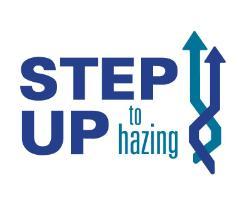
Prevention
Understanding Hazing and Its Harms
The key to keeping your friends and others safe is to learn how to intervene in a way that fits the situation and your comfort level. Having this knowledge on hand can give you the confidence to step in when something isn't right. Stepping in can make all the difference, but it should never put your own safety at risk.
Your Role in Preventing Hazing
Everyone has a role to play in preventing hazing and its associated harms. You can step in or make a difference in many different ways if you see someone at risk.
Ways to Intervene Safely
Bystander Intervention
7 Steps to an Effective Bystander Intervention
- Recognize the behavior is happening
- Interpret behavior as a problem
- Feel a sense of responsibility
- Know what to do (or not do)
- Feel you have the ability to take action
- Perform a quick cost/benefit analysis
- Act (direct, distract, delegate, discuss)
Team Building
Team building is essential to healthy groups and also serves to encourage alternatives to hazing by encouraging group bonding.this resource
Please see Promoting Group Bonding (pdf) flyer for creative ideas.
Step Up to Hazing
Longwood University developed a module in which students participate each year from a number of student organizations and teams which is focused on bystander intervention.
Intervene Film
Cornell University created a short film called Intervene that includes several brief scenarios demonstrating ways in which student bystanders successfully intervene in problematic situations. Seven different situations are addressed in the film, including sexual assault, sexual harassment, intimate partner violence (emotional abuse), hazing, an alcohol emergency, emotional distress, and bias.
Intervene is based on real-life situations faced by students at Cornell and beyond.
The interventions shown are grounded in social behavior theories and public health research.
Content was developed and evaluated by the Skorton Center for Health Initiatives at Cornell Health.
Watch the film
The film Intervene recognizes all members of a campus community as collaborative partners in the cultivation of campus health and well-being. It also demonstrates the versatility of bystander intervention as a strategy that can be used to address a variety of campus issues.
This film, Intervene, is 19.47 minutes long.
The hazing-specific scene begins at 3:17
Read the Video transcript.
Intervene was developed by the Skorton Center for Health Initiatives and the Cornell Interactive Theater Ensemble.
Learn more about Intervene and the corresponding workshop.
Information in this section was used/adapted with permission of the Skorton Center at Cornell University.

